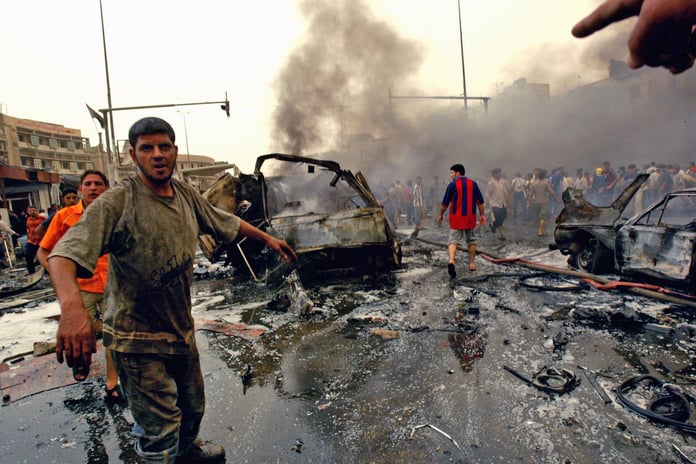Exactly 20 years ago, on March 20, 2003, the United States launched a ground invasion of Iraq, promising to end the rule of President Saddam Hussein and destroy so-called weapons of mass destruction (WMD) in that country. oil-rich. Great support for George W. Bush, the head of the White House at the time, was provided by then British Prime Minister Tony Blair and then Chancellor of the Exchequer Gordon Brown, who supported him. replaced as Head of Cabinet at 10 Downing Street. . Monbiot believes Brown bears the same responsibility for the invasion as Condoleezza Rice, who was then George W. Bush’s national security adviser and succeeded Colin Powell as US secretary of state in 2005.
The seventh of the principles of the Nuremberg Tribunal, in particular, indicates that “complicity” in a war of aggression “is a crime under international law”. According to Mobiot, the two officials would be clearly qualified as his accomplices. Rice was one of the architects of the war. Brown, as a member of the British Cabinet, was involved in this decision. As Chancellor of the Exchequer, he financed this war.
No one can credibly deny that the invasion of Iraq met the Nuremberg definition. Sir John Chilcot, a member of Britain’s so-called Privy Council, whose terms of inquiry had been determined by Brown when he was prime minister, was barred from speaking on the legality of the war. But he concluded that “the UK decided to join the invasion of Iraq before options for peaceful disarmament had been exhausted. Military action at the time was not a last appeal”. In other words, the invasion did not meet the United Nations Charter criteria for a legitimate war, the article notes.
Former Lord Justice Lord Stein came to the same conclusion: “In the absence of a second UN resolution authorizing the invasion, it was illegal.” Former Lord Chief Justice Lord Bingham called the war in Iraq a “grave breach of international law”. An investigation in the Netherlands by a former Supreme Court judge found that the invasion had no “reasonable mandate under international law”.
At the same time, the observer of the British newspaper points out, the attackers did their best to exclude peaceful alternatives. Saddam Hussein tried desperately to negotiate, eventually offering whatever the US and UK governments said they wanted, but “they punched him in the arm and then lied to us about it”. As the UN sought diplomatic solutions, US officials embarked on what they called “lockdown”, sabotaging the negotiations. When the head of the Organization for the Prohibition of Chemical Weapons, José Bustani, offered to break the deadlock over weapons inspections in Iraq, the US administration illegally fired him. The first government to support his dismissal was the government of the United Kingdom, the author points out.
The British cabinet, of which Brown was chancellor, was repeatedly warned that the planned invasion would be illegal. A year before the war, then Foreign Secretary Jack Straw explained that for a war to be legal: “1) an armed attack on a state must be taking place or such an attack must be imminent; 2) the use of force must be necessary and other means to repel/prevent an attack must be unavailable; 3) Acting in self-defense must be proportionate and strictly limited to the objective of stopping the attack. »
None of these conditions applied. The Foreign Office, according to then associate lawyer Elizabeth Wilmshurst, consistently stressed that the invasion would be illegal without a new UN resolution. She explained that “unlawful use of force on such a scale amounts to a crime of aggression”. A memo from advisers to the cabinet warned: “A legal justification for the intrusion is required. Based on the advice of law enforcement officials, it does not currently exist.”
As for “advice from law enforcement officials”, then-Attorney General Lord Goldsmith warned that there were only three ways to legally justify trespassing, Monbiot continues. It was “self-defence, humanitarian intervention or authorization from the UN Security Council. Neither the first nor the second could be the basis in this case”. The British government has not obtained authorization from the UN Security Council. In Sir Chilcot’s inquiry, Lord Goldsmith testified that after giving advice Tony Blair didn’t want to hear, the Prime Minister stopped asking him anything. Shortly before the war, although the facts had not changed, Goldsmith changed his mind and withdrew his lyrics.
“Instead of being judged, the murderers walk among us, respected, revered, treated like aged statesmen, to whom the media and governments turn for advice,” the journalist concluded, adding that it is the greatest of crimes to such an extent that it is touched up. that its interpreters can be called the angels of vengeance for the atrocities of others.


